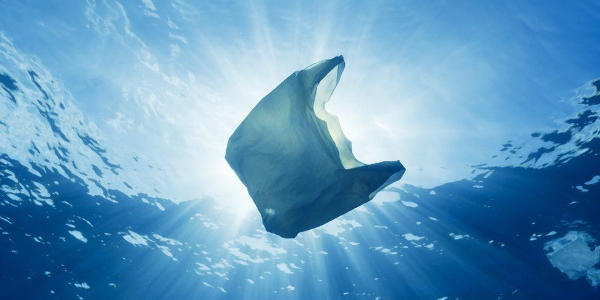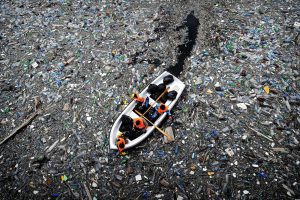
February 16, 2018, by sustainablenottingham
Ingenuity18: solutions to reduce plastic use
Every year, around 8 million metric tonnes of plastic waste enters the ocean, where it can prove fatal to marine life. For scale, that’s the equivalent of a full rubbish truck of plastic being dumped in the ocean every minute. Ocean plastics was the focus of the final episode of the popular Blue Planet II BBC series which aired in late 2017.
Plastics represent a collective problem: the University alone uses over 800,000 plastic bottles a year. If all the plastic drinks bottles we used as a University were lined up end-to-end, they would stretch across University Park campus almost 100 times. Whilst we endeavour to ensure that we don’t contribute directly to the issue of marine plastic waste, profligate use of plastic as the default is part of a wider problem.
One of the ways we’re addressing this is by challenging 300 students, staff and alumni to come up with solutions to help drive down our use of single-use plastics as an institution through Ingenuity18.
 Through Blue Planet II David Attenborough spoke of the impact our modern lives are having on marine life. The series has shone a light on how our individual choices and impacts as humans go on to have an impact on the natural environment. BBC Earth has produced a number of handy resources on positive impacts you can make, and things you can do to help the oceans, including a #2MinuteBeachClean, refusing plastic straws, and avoiding microplastics.
Through Blue Planet II David Attenborough spoke of the impact our modern lives are having on marine life. The series has shone a light on how our individual choices and impacts as humans go on to have an impact on the natural environment. BBC Earth has produced a number of handy resources on positive impacts you can make, and things you can do to help the oceans, including a #2MinuteBeachClean, refusing plastic straws, and avoiding microplastics.
Plastics are not going to disappear, but the way we think about, treat and use plastics needs to change throughout the entire lifecycle. Plastics have provided huge advances in human development in medicine, electronics, construction and many more. Plastics also provide many sustainability benefits such as preserving food helping us to avoid food waste: a shrink-wrapped cucumber will last more than three times as long as an unwrapped one, important when you consider the embedded energy in growing, transporting and storing that cucumber as much greater than the packaging it comes it.
Our Vice-Chancellor, Professor Shearer West, has asked the University’s Sustainability team to produce a plan for how we can reduce our plastic use over the coming years. As part of Ingenuity18, we will pitch the issue of plastics reduction at the University to student, staff, and alumni teams. The best ideas will progress to the Ingenuity18 competition, which awards over £100,000 to support proposals and pitches that demonstrate the most potential.
Each of us contributes in a small way to how much single-use plastic the University uses. We hope to use the ideas of Ingenuity18 and identify the best ideas from our University community, helping us to avoid unnecessary plastics.

Can the University invest in suitable working dish washer at KMC please. We are told on many occasions that the dish washer isn’t working and that they have to use plastic containers to serve the meals in. All the boxes are then in the waste.
Hi Pam,
Thanks for this – we’ve passed this onto our Catering team for a response.
I bought several packs of glasses from Ikea for our office to encourage everyone to use those rather than the plastic cups supplied with the water cooler. After all everyone uses their own mugs to make tea and coffee in the office.
I understand University supplier’s for catering are based in Heathrow so when we order lunches etc it has to come a long way – not very environmentally friendly! There is an awful lot of plastic waste that comes with the food too. Can our catering be sourced locally? Can we insist our suppliers use alternative packaging such as cardboard boxed and plastic when it is only absolutely necessary – which is what our local takeaways are doing and some supermarkets are starting to do – eg Iceland.
Hi Sue,
We’ve passed this onto our Catering teams to get more information on this.
Sustainability Team
As takeaway cups are all lined with plastic, can the University introduce a “reusable” cup scheme in all its cafes, including Costa franchises. Lots of workplaces do this already – or the University can offer an incentive scheme to encourage people to do so (e.g. a stamp card, collect X stamps, and you get a drink free). You can insist on cups with covers if you’re concerned about spillages in the corridors!
Hi Melissa,
Thanks for you comment – rewarding customers for reusing a cup is definitely something other organisations have had success with and needs to be looked at. Cups with covers (rather than just mugs) is a good point too!
Sustainability Team
The university should stop providing plastic water cups for staff. The libraries, for instance, don’t provide plastic cups for the students in order to encourage them to reuse water bottles. Similarly, staff members should be encouraged to do the same thing.
Hi Denise,
A great idea – we’ll discuss this at our next meeting on single-use plastics.
The problem there is that it is not recommended to re-use plastic water bottles due (I presume) to the cheap plastic used in their construction. Most carry a statement to that effect (not to re-use them, that is, not that they’re made of single-use plastic). I do agree the plastic cups need to be eradicated …. more thought on this one needed perhaps.
This is a research institution. Are we researching into biodegradable plastics? Are we looking at what can be done with Galleria mellonella (the plastic-eating caterpillar)?
Interesting point Jon – we’ll raise this at our working group meeting of colleagues across the University. Joining up operations and research is something more Universities should look to do.
Could the university please look into creating less waste or at least biodegradable e.g wooden cutlery to replace single-use plastics. I think a massive issue is the amount of plastic packaging that is in the supermarket, such as on fruit and veg. Maybe this could be campaigned on?
As well as raising awareness of the steps you’re taking in the Sustainability newsletter (e.g. places on campus where you can buy re-useable mugs), can you make sure this information gets into departmental newsletters as well to broaden your reach?
We will be developing a larger and high profile campaign around single-use plastics – you’ll be able to see it develop in the next couple of months. If there are specific newsletters to share this information to, would you be able to let us know details emailing sustainability@nottingham.ac.uk ?
I was studying in George Green library the other day and I noticed that the bins were being emptied almost hourly, despite them being almost empty, which is a huge waste of plastic bin liners. Could something be done about this?